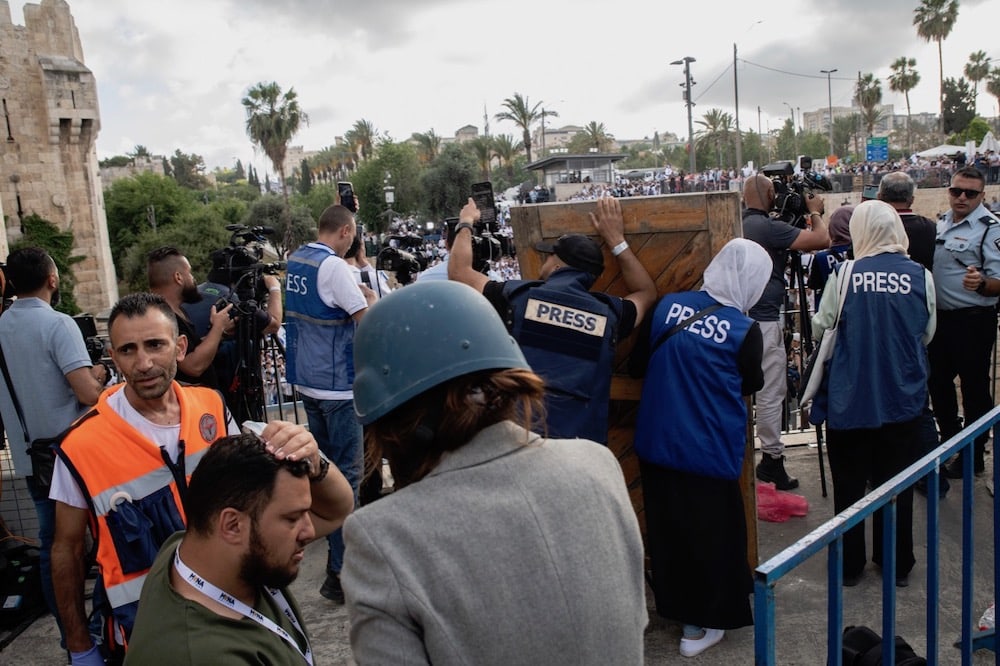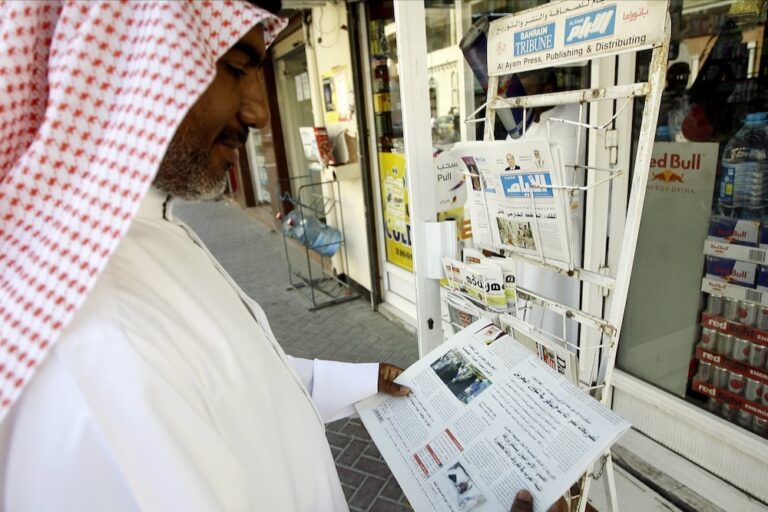May 2023 in MENA: A free expression round up produced by IFEX’s Regional Editor Naseem Tarawnah, based on IFEX member reports and news from the region.
Egypt uses terrorism lists to suppress critics. Women human rights defenders and journalists targeted in Sudan. Israeli impunity fuels deadly reporting field for Palestinian journalists. Also, French court confirms jurisdiction over Syria war crimes cases, and other civil society wins.
Egypt: Crimes of the future, past and present
Egypt’s government launched its much-anticipated and highly criticised national dialogue last month amidst an ongoing security crackdown on critics. Despite the release of detained journalists Raouf Ebeid and Hisham Abdel Aziz two days before the national dialogue discussions began, as well as assurances from President Abdel Fattah El-Sisi of a dialogue open for “all political forces without an exclusion”, tens of thousands of political prisoners remain behind bars, undermining the purported reform effort.
Egyptian authorities continue to wield “terrorism lists” as a tool to suppress citizens’ freedom of expression and association and exact revenge on the political opposition and critics. Last month it was revealed that 81 individuals, including human rights defenders and political activists were added to terrorism lists for five years, in addition to a freezing of their assets and a travel ban. The list also included at least 32 journalists from news organisations critical of El-Sisi’s government.
A Cairo Criminal Court also ordered a five-year extension of 1,526 Egyptians already on terrorism lists, most of whom are defendants in a 2018 case, and some who passed away, like former Egyptian president Mohamed Morsi who died in detention in 2019.
According to Egyptian rights groups, these decisions reflect the ongoing use of broadly defined counter-terrorism laws that repeatedly target thousands of peaceful government opponents while depriving them of fair trials. Interpretation of articles in the country’s Terrorism Entities Law empowers the judiciary to impose penalties for crimes that have not yet been committed, based solely on the intention to commit what is believed to be a terrorist crime.
Sequestering justice further, authorities have widely deployed an “inherently abusive” videoconference system since 2022 to remotely conduct pretrial detention hearings and permanently avoid bringing detainees to court in person. First deployed as a response to the COVID-19 pandemic, the system ensures vulnerable detainees are kept in isolation and arbitrarily denied visits or correspondence with family and lawyers.
According to Human Rights Watch (HRW), by undermining detainees’ right to physically stand before a judge and have access to their legal defence, this flawed remote system: “exacerbates long standing abusive pretrial detention practices and flagrant due process violations, and effectively contributes to covering up abusive detention conditions”.
The lives of many of those kept in arbitrary detention continue to be at risk as they face harsh treatment by prison authorities. In May, rights groups drew attention to the case of imprisoned academic Salah Soltan who has been denied access to adequate health care despite suffering from life-threatening heart and liver diseases.
Rights groups also raised concerns over poet Galal El-Beheiry’s health following an escalation of a hunger strike he began in March, marking the fifth anniversary of his arrest. El-Beheiry said he would refrain from taking fluids and medications on 1 June to protest his continued unjust detention. In a letter smuggled from his prison cell, El-Beheiry wrote:
“Against my own self, as I drift away each passing day, losing touch with the human inside, led astray. As I turn into a creature of concrete, in a place of concrete, by a law of concrete. Against all of this, in defense of what’s left within, on the impending 1st of June, my battle will begin, a strike against life itself, with a fervent plea, to reclaim life, and set myself free.”
Security forces abducted human rights activist Moaz al-Sharqawi from his home on 11 May. The former student union Vice President was forcibly disappeared for 22 days before appearing in court to face new charges of reportedly “joining a terrorist group”. The last time this happened was in September 2018, when he was subjected to prolonged detention over his university union activities, before being released in 2020.
Authorities also arbitrarily detained at least 12 family members and perceived supporters of former parliament member Ahmed Tantawy in the weeks following an announcement that he would return to Egypt and run for president in the 2024 elections. Tantawy left for Lebanon in August 2022 after resigning as the head of the leftist al-Karama Party, reportedly due to pressure from security agencies.
Reprisals against families of activists and critics living abroad has been an escalating tactic. Dissidents that have sought refuge in countries such as Turkey and Lebanon remain vulnerable to political coercion exerted by Egypt on regional governments.
Safety concerns were raised last month after activist and former prisoner of conscience Abdelrahman Tarek was detained for several hours by Lebanese authorities with fears that he would face deportation.
Although the reason for the arrest remains unclear, advocates that pushed for Tarek’s freedom pointed to the effective mass mobilisation efforts of Lebanese civil society as instrumental in his quick release. A planned protest outside police headquarters was called off after the exiled blogger was freed. “We gave them hell,” activist Ramy Shaath told Al Jazeera, calling the incident a “warning” but the result “a good sign for other dissidents in Lebanon”.
Israeli impunity contributes to a “deadly reporting field” for Palestinian journalists
One year on, justice for the killing of veteran Palestinian-American journalist Shireen Abu Akleh remains elusive. “Shireen’s killing represents a deeply disturbing attack on the press, not least because of credible reports that she and other journalists were intentionally targeted by Israeli forces, but also in light of rampant impunity for crimes against journalists by Israel in the occupied Palestine territory,” said IPI Executive Director Frane Maroević.
Highlighting the extent of Israeli impunity, a new report by the Committee to Protect Journalists (CPJ) exposes a long pattern of lethal force against journalists by Israeli forces and inadequate responses that evade accountability. The report documents at least 20 journalists killed by Israeli forces since 2001, including 18 Palestinians, with no one charged or held accountable for their deaths.
Extreme restrictions on movement mean that Palestinian journalists are confined to live as well as report in sites of major violence; this, combined with Israeli soldiers’ views on Palestinian journalists, has contributed to a deadly reporting field. On the justice front, Israel’s procedures for examining military killings of journalists is a ‘black box’, with Israeli military probes designed to shield soldiers from accountability and their findings kept confidential.
IFEX member MADA condemned the widespread attacks against journalists in Jerusalem during last month’s so-called ‘flag march’ on 18 May. According to MADA, Israeli police targeted Palestinian journalists and obstructed their reporting, while protecting Israeli settlers leading the marches as they unleashed various forms of attacks and racist practices against residents and journalists alike. The annual event saw thousands of ultra-nationalist Israelis, including far-right National Security Minister Itamar Ben-Gvir, storming the Al-Aqsa mosque to mark Israel’s illegal occupation of East Jerusalem in 1967. Marchers threw rocks, bottles and various objects at citizens, injuring several journalists.
Sudan: Journalists, women activists targeted amid an information blackout
UN experts say civilians are bearing the brunt of hostilities between the Sudanese Armed Forces (SAF) and the Rapid Support Forces (RSF) in the midst of increasingly obstructed reporting efforts.
Calling for an immediate and impartial investigation into gross human rights violations against vulnerable groups, the UN experts said: “The targeting of journalists and intimidation and threatening of human rights defenders, including women human rights defenders in Darfur and Khartoum, has impinged their ability to monitor and document the situation on the ground, contributing to an information blackout.”
Last month, soldiers with the RSF assaulted and robbed at least three journalists and briefly detained two of them.
CPJ has called on all parties to stop detaining and assaulting the press for their work and ensure that journalists can do their work without fear. According to the Sudanese Journalists Syndicate, local and international journalists have been subjected to threats, intimidation and physical attacks to prevent them from reporting about the conflict, exacerbating already restricted press freedom.
Sudanese women human rights defenders and women’s groups urged the UN Human Rights Council last month to establish an international investigation mechanism to examine the rising threats, reprisals, and gender-based violence WHRDs have been facing for their work since hostilities between the warring factions began in April. Women activists calling for an end to the war have reported receiving threats following an online defamation campaign led by members of the former regime and supporters of the military.
Also Noteworthy
In a win for Syrian victims, two rulings issued last month by France’s Court of Cassation confirmed the jurisdiction of French courts to hear cases regarding war crimes and crimes against humanity committed in Syria. “These decisions offer significant hope to Syrian victims and, more generally, to victims of international crimes who have turned to French justice,” said Syrian human rights lawyer Mazen Darwish.
The seventh session of the Palestine Digital Activism Forum took place last month with a focus on the theme of “Ending Digital Discrimination against Palestinians”. Hosted by IFEX member The Arab Center for the Advancement of Social Media (7amleh), this year’s event saw participants tackle various challenges and threats that threaten Palestinians and other marginalised communities online.
In Lebanon, IFEX member MARCH produced a Freedom of Expression & Dialogue Handbook. Written and designed by young participants of the Challenging Censorship program, the handbook tackles wide-ranging freedom of expression issues, including promoting positive communication, constructive argumentation, values of freedom of expression, and pluralism.
Maharat Foundation published the results of their media monitoring of public discourses during Lebanon’s 2022 elections. The report tracked and examined misleading narratives, manipulation campaigns, political propaganda and hate speech on Facebook and Twitter. The IFEX member also conducted media monitoring of public, and often violent discourse around women’s participation in the 2023 municipal elections.
IFEX member Vigilance for Democracy and Civil Society honoured imprisoned Moroccan journalist Taoufik Bouachrine with the organisation’s annual Najiba Hamrouni Award for Journalism Ethics, an annual prize for journalists in the Meghreb region in memory of the late pioneering Tunisian journalist Najiba Hamrouni.
Tunisian investigative journalist Abdellatif El Hamamouchi received the Freedom of Expression and Media Award in North Africa by ARTICLE 19 and the United Nations Democracy Fund.
Lastly, the Los Angeles city council voted last month to rename the street outside the Saudi consulate “Jamal Khashoggi Way” in honour of the slain journalist. The human rights organisation founded by Khashoggi, Democracy for the Arab World Now worked with city council representatives to secure the passage of the resolution, building on successful efforts in 2021 to rename the street in front of the Saudi Embassy in Washington, D.C.



